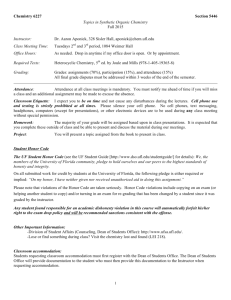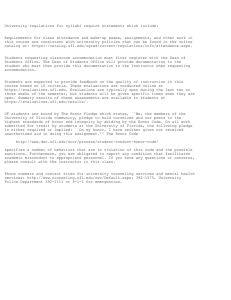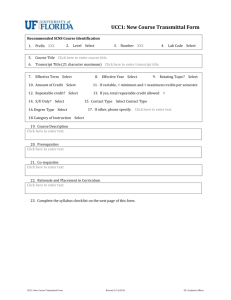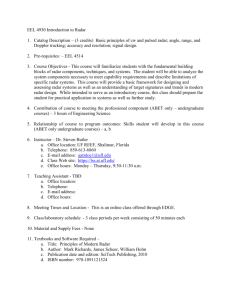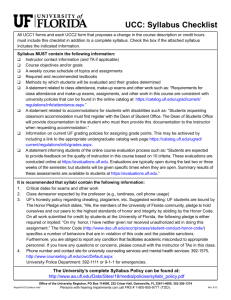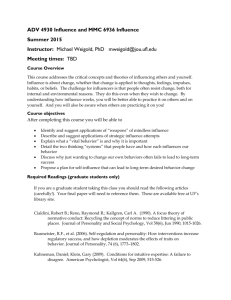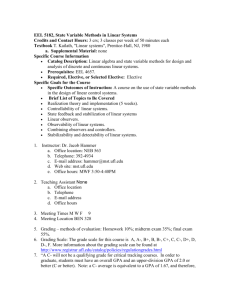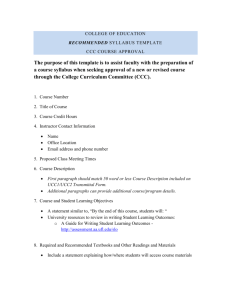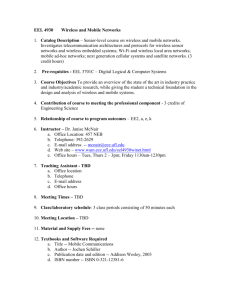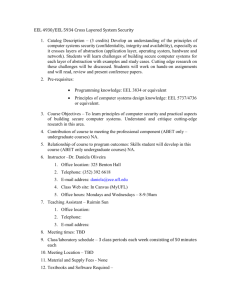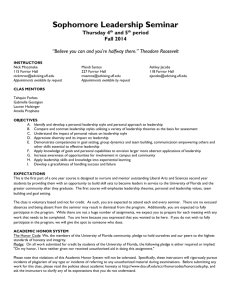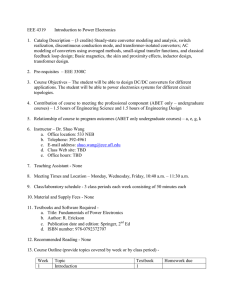Spring 2016 - Associate Chair Home
advertisement
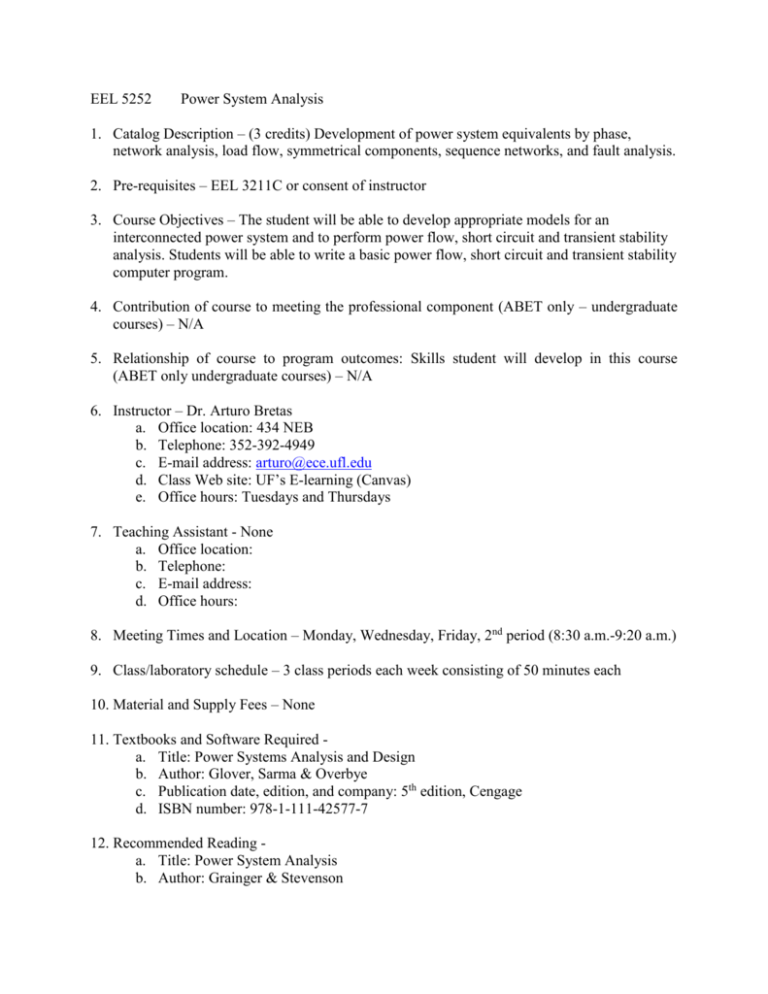
EEL 5252 Power System Analysis 1. Catalog Description – (3 credits) Development of power system equivalents by phase, network analysis, load flow, symmetrical components, sequence networks, and fault analysis. 2. Pre-requisites – EEL 3211C or consent of instructor 3. Course Objectives – The student will be able to develop appropriate models for an interconnected power system and to perform power flow, short circuit and transient stability analysis. Students will be able to write a basic power flow, short circuit and transient stability computer program. 4. Contribution of course to meeting the professional component (ABET only – undergraduate courses) – N/A 5. Relationship of course to program outcomes: Skills student will develop in this course (ABET only undergraduate courses) – N/A 6. Instructor – Dr. Arturo Bretas a. Office location: 434 NEB b. Telephone: 352-392-4949 c. E-mail address: arturo@ece.ufl.edu d. Class Web site: UF’s E-learning (Canvas) e. Office hours: Tuesdays and Thursdays 7. Teaching Assistant - None a. Office location: b. Telephone: c. E-mail address: d. Office hours: 8. Meeting Times and Location – Monday, Wednesday, Friday, 2nd period (8:30 a.m.-9:20 a.m.) 9. Class/laboratory schedule – 3 class periods each week consisting of 50 minutes each 10. Material and Supply Fees – None 11. Textbooks and Software Required a. Title: Power Systems Analysis and Design b. Author: Glover, Sarma & Overbye c. Publication date, edition, and company: 5th edition, Cengage d. ISBN number: 978-1-111-42577-7 12. Recommended Reading a. Title: Power System Analysis b. Author: Grainger & Stevenson c. Publication date and edition: 1st edition (1994), McGraw-Hill d. ISBN number: 978-0070612938 13. Course Outline – Chapters in Textbook 1, 2 3,4 Topic Introduction, review of three-phase power Transmission-line parameter computation & transmission-line modeling Exam 1 Transformer, generator, and load modeling Power flow analysis Exam 2 Generation Control, economic dispatch and restructuring Transient stability Exam 3 Short circuit analysis, including symmetrical components System protection Exam 4 Approx Number of Classes 3 5 1 3 9 1 6 4 1 6 3 1 5 6 13 7,8 14. Attendance and Expectations - This course is co-taught with EEL 4251 Power System Analysis. Undergraduate students should register for EEL 4251. Attendance is expected but not required. Some simple programming may be required to complete the homeworks. Cell phones and other electronic devices are to be silenced. No text messaging during class or exams. Requirements for class attendance and make-up exams, assignments, and other work in this course are consistent with university policies that can be found in the online catalog at: https://catalog.ufl.edu/ugrad/current/regulations/info/attendance.aspx 15. Grading – 80% In-class exams 20% Homework - There will be different homework assignments for undergraduate and graduate students. 16. Grading Scale – A 95-100 A- B+ B B- C+ C C- D+ D D- E 91-94 87-90 83-86 80-82 77-79 73-76 70-72 67-69 63-66 60-62 0-59 “In order to graduate, graduate students must have an overall GPA and an upper-division GPA of 3.0 or better (B or better).” Note: a B- average is equivalent to a GPA of 2.67, and therefore, it does not satisfy this graduation requirement. For more information on grades and grading policies, please visit: http://gradschool.ufl.edu/catalog/current-catalog/cataloggeneral-regulations.html#grades 17. Make-Up Exam Policy - If you have a University-approved excuse and arrange for it in advance, or in case of documented emergency, a make-up exam will be allowed and arrangements can be made for making up missed work. University attendance policies can be found at: https://catalog.ufl.edu/ugrad/current/regulations/info/attendance.aspx Otherwise, make-up exams will be considered only in extraordinary cases, and must be taken before the scheduled exam. The student must submit a written petition to the instructor two weeks prior to the scheduled exam and the instructor must approve the petition. 18. Honesty Policy – UF students are bound by The Honor Pledge which states, “We, the members of the University of Florida community, pledge to hold ourselves and our peers to the highest standards of honor and integrity by abiding by the Honor Code. On all work submitted for credit by students at the University of Florida, the following pledge is either required or implied: “On my honor, I have neither given nor received unauthorized aid in doing this assignment.” The Honor Code (http://www.dso.ufl.edu/sccr/process/student-conduct-honor-code/) specifies a number of behaviors that are in violation of this code and the possible sanctions. Furthermore, you are obligated to report any condition that facilitates academic misconduct to appropriate personnel. If you have any questions or concerns, please consult with the instructor or TAs in this class. 19. Accommodation for Students with Disabilities – Students requesting classroom accommodation must first register with the Dean of Students Office. That office will provide documentation to the student who must then provide this documentation to the course instructor when requesting accommodation. 20. UF Counseling Services – Resources are available on-campus for students having personal problems or lacking clear career and academic goals. The resources include: · UF Counseling & Wellness Center, psychological and psychiatric services, 3190 Radio Rd, 392-1575, online: http://www.counseling.ufl.edu/cwc/Default.aspx, · Career Resource Center, Reitz Union, career and job search services, 392-1601. · University Police Department, 392-1111 or 911 for emergencies 21. Software Use – All faculty, staff and student of the University are required and expected to obey the laws and legal agreements governing software use. Failure to do so can lead to monetary damages and/or criminal penalties for the individual violator. Because such violations are also against University policies and rules, disciplinary action will be taken as appropriate. We, the members of the University of Florida community, pledge to uphold ourselves and our peers to the highest standards of honesty and integrity. 22. Course Evaluation – Students are expected to provide feedback on the quality of instruction in this course based on 10 criteria. These evaluations are conducted online at: https://evaluations.ufl.edu. Evaluations are typically open during the last two or three weeks of the semester, but students will be given specific times when they are open. Summary results of these assessments are available to students at: https://evaluations.ufl.edu/results.
